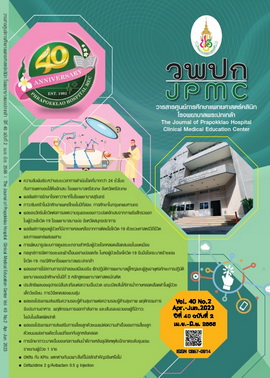Effects of A Breastfeeding Promotion Programme on the Success of Exclusive Breastfeeding in Postpartum Mother-Infant Separation
Main Article Content
Abstract
BACKGROUND: Nowadays, the rate of successful 6-month exclusive breastfeeding worldwide and in Thailand is lower than the regulation set by the World Health Organisation. Separating a mother from her baby after birth has been shown to lead to a reduced success rate of exclusive breastfeeding. A breastfeeding promotion programme that focuses on breastfeeding education and encouragement of family members or health professionals to support breastfeeding during hospitalisation can enhance the success of exclusive breastfeeding.
OBJECTIVES: This study aimed to examine the effects of a breastfeeding promotion programme on the success of exclusive breastfeeding in postpartum mother-infant separation from 6 to 24 hours after delivery and at 3,7 and 14 days after discharge from the hospital between experimental and control groups.
METHODS: This study utilised a repeated two-group quasi-experimental approach. The research samples comprised mothers and new-borns who underwent delivery at Prapokklao Hospital. Purposive sampling was used, and the research instrument was a breastfeeding promotion programme. Data were collected by personal information questionnaires, the checklist record process of breastfeeding and the LATCH score, including the record follow-up of exclusive breastfeeding questionnaires. Descriptive statistics, independent sample t-tests and repeated measures ANOVA were used to analyse the data.
RESULTS: The average for successful exclusive breastfeeding among mothers from their babies between the control and experimental groups during hospitalisation on day 1 was not significant. However, there was a significant difference on day 3 (p <.05). The comparison of successful exclusive breastfeeding in postpartum mother-infant separation between the control and experimental groups on day 3 and day 7 showed a significant difference (p<0.05).
CONCLUSIONS: The programme for promoting breastfeeding in mother-infant separation affected the success of breastfeeding only during the period of hospital admission. However, no difference was found 3, 7 and 14 days after being discharged from the hospital.
Article Details

This work is licensed under a Creative Commons Attribution-NonCommercial-NoDerivatives 4.0 International License.
References
World Health Organization (WHO). Breastfeeding. [Internet]. 2018 [cited 2021 Jan 28]. Available from: https://www.who.int/health-topics/breastfeeding#tab=tab_1
National Statistical Office, Thailand. The survey report of child and women situation in Thailand [Internet]. 2018 [cited 2021 Jan 28]. Available from: http://www.nso.go.th/sites/2014/DocLib13/ด้านสังคม/สาขาประชากร/สถานการณ์เด็กและสตรี/2562/manual2562.pdf
Wongphinit U, Sinsuksai N, YusamranC. Personal factors, social support and effective suckling at dischargein predicting exclusive breastfeeding at one monthamong first-time mothers. Journal of The Royal Thai Army Nurses 2016;17(1):88-95.
Armmapat C,Deejapo J, Wichainprapha A, Bunjongkarn M, Suksamphan S. The effect of promoting spousal support for fatigue management on quality of life among primiparous postpartum mothers. J Prapokklao Hosp Clin Med Educat Center 2021;38:343-50.
Khaonark R, Kala S, Chatchawet W. Perception in breastfeeding of postpartum mothers with newborns hospitalized in neonatal intensive care unit. Songklanagarind Journal of Nursing 2020;40(1):30-44.
Kaewkiattikun K, Phathaisiriphat P. Effects of mother-infant skin to skin contact on successful breastfeeding in postpartum mother-infant separation: a randomized controlled trial. Vajira Medical Journal: Journal of Urban Medicine 2018;62:315-26.
Kala S, Khaonark R. Breastfeeding in postpartum mothers of sick newborns. Songklanagarind Journal of Nursing 2016;36(4):196-208.
Puapornpong P. Breastfeeding assessment. Journal of Medicine and Health Sciences 2014; 21(1):10-21.
Kantaruksa K, Sansiriphun N, Prasitwattanaseree P. Development of breastfeeding promotion models for instructors faculty of nursing, Chiang Mai university and nurses Maharaj Nakorn Chiang Mai hospital. Nursing Journal 2014;41(5):158-68.
Chanapai S, Sinsuksai N, Thananowan N, Phahuwatanakorn W. Knowledge, attitude, self-efficacy, spousal and nurse support predicting 6-weeks exclusive breastfeeding. Journal of Nursing Science 2014;32(1):51-60.
Apartsakun P, Wongphinit U. Effectiveness of “breastfeeding support package” to the ability to breastfeed among postpartum women. Journal of The Royal Thai Army Nurses 2019;20(2):102-11.
Pasuwan D. Success of exclusive breastfeeding for at least the first 6 months: a case study of Nakhon Pathom province. Kuakarun Journal of Nursing 2020;27(1):71-84.
Ngamgarn W, Leesiriwattanagul W, Perksanusak T, Nuampa S. Effect of a nursing program for continuous breastfeeding promotion with family support and early skin to skin contact on effective suckling breastfeed, neonatal jaundice, and exclusive breastfeeding at one month. J Prapokklao Hosp Clin Med Educat Center 2021;38:67-76.
Barona-Vilar C, Escribá-Agüir V, Ferrero-Gandía R. A qualitative approach to social support and breast-feeding decisions. Midwifery 2009;25:187-94.

